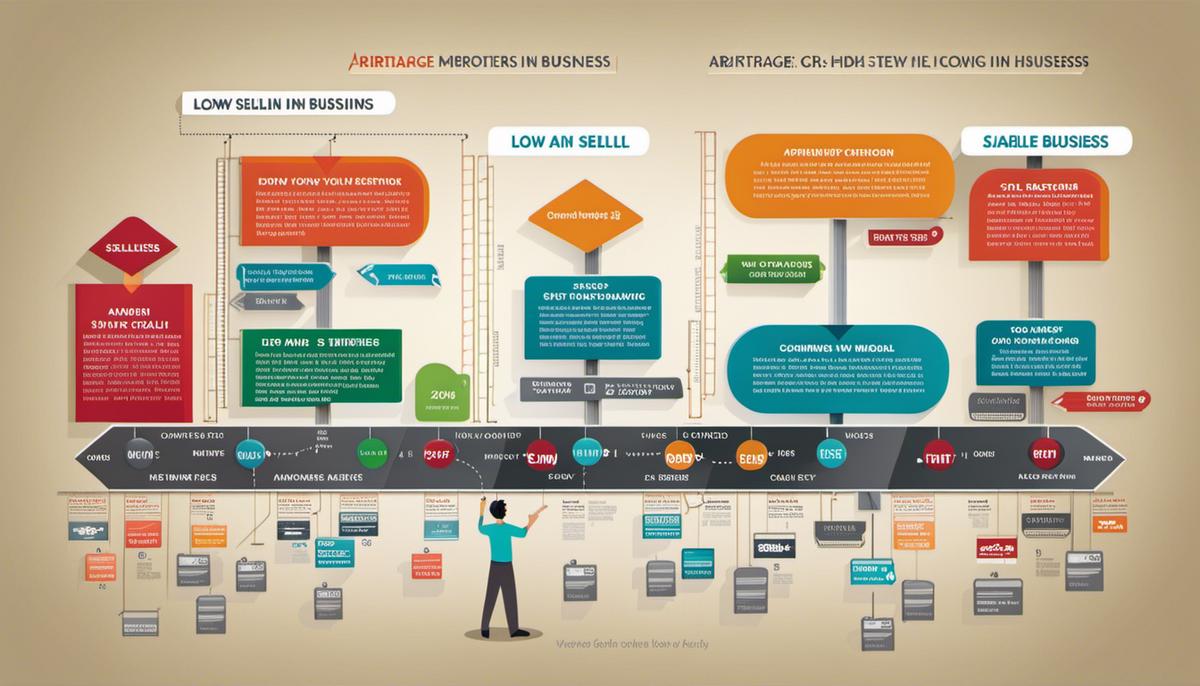In the continuously evolving business landscape, savvy entrepreneurs are always on the lookout for unique ways to capitalize on market discrepancies. One such strategy that has garnered considerable attention over recent years is arbitrage – a versatile and potentially lucrative business model.
This article dives deep into the world of arbitrage business ideas, walking you through the basics, unraveling the complexities, and presenting a step-by-step guide on how to launch your own successful arbitrage business.
It will also delve into real-world examples, shedding light on proven strategies and the challenges faced by successful arbitrage businesses, thereby providing you with a solid foundation on which to build your own entrepreneurial venture.
Table of Contents
ToggleUnderstanding Arbitrage in Business
Understanding Arbitrage in Business
Arbitrage in business is a financial strategy where an individual takes advantage of a price difference between two or more markets. Essentially, it involves buying a product or asset in one market at a lower price and then selling it in another market at a higher price. The profit is the difference between the buying and selling price, less any transaction costs.
Different Types of Arbitrage
There are several types of arbitrage, each suited to different industries and niches.
Retail Arbitrage
In the retail industry, arbitrage is commonly practiced through a method known as retail arbitrage. Individuals buy products at discounted prices in retail stores and sell them online at a higher price. The disparity in pricing between in-store and online markets allows individuals to take advantage of potential profit margins.

Online Arbitrage
Online arbitrage is an advanced form of retail arbitrage. It involves the same general concept of buying low and selling high, but everything is done online. Entrepreneurs buy products from online retailers at a lower price and sell them on a different e-commerce platform for profit.
Sports Arbitrage
Sports arbitrage, also known as sure bets or miracle bets, involves betting on all possible outcomes of a sporting event across different bookmakers to assure a profit. As bookmakers have different odds for events, bettors can take advantage of the odds disparity to guarantee they make a profit no matter the outcome of the game.
Risk Arbitrage
Risk arbitrage, also known as merger arbitrage, is more complex. Traders in this scenario bet on the successful completion of corporate events such as mergers, acquisitions, or a leveraged buyout. Traders buy the company’s stock at a lower price before merger announcements, expecting that it will rise when the deal is confirmed. The profit is the difference in the stock price before and after the event.
Arbitrage in Different Industries and Niches
While it’s most common in finance and retail, arbitrage can be used in different industries and niches. In the energy sector, companies can buy electricity in markets where it is cheap and sell it in markets where it is expensive.
In the real estate market, an investor can buy a property in a low-cost area and sell or rent it in a high-cost area. In the entertainment industry, ticket scalping is a form of arbitrage where a person buys tickets at face value and re-sells them at higher prices.
Despite the potential profits, arbitrage is not without risks. These can include operational risks, market risks, and regulatory risks.
To wrap up, arbitrage presents a range of opportunities across different business contexts. However, as with all business pursuits, careful research, strategic planning, and mindful risk management are essential for achieving success in arbitrage.

Exploring Examples of Successful Arbitrage Business Ideas
The World of Online Retail Arbitrage Through Quick Lots
Online retail has emerged as a favored venue for arbitrage, with numerous entrepreneurs using the disparity in prices across online marketplaces to gain profits. A prime example of an arbitrage business is Quick Lots.
This organization capitalizes on online retail arbitrage, purchasing products in large quantities at substantially low prices and selling these goods individually on platforms such as Amazon and eBay at significantly higher prices.
For a successful operation, Quick Lots constantly engage in market research to keep updated with market trends, customer demands, and alterations in retail prices across various platforms.
While this rigorous research process can be time-intensive, the high returns garnered make it worthwhile. Additionally, Quick Lots reinforce its logistics system by investing in warehouse solutions, thus ensuring fast and efficient delivery to their customers.
However, the road to success hasn’t been smooth for Quick Lots. With online marketplaces evolving and consumer behaviors changing frequently, forecasting demand turned into a meticulous process. The business also ran the risk of incurring losses due to drastic shifts in market prices. Additionally, they faced the constant need to update their inventory and streamline their supply chain management.
In spite of these hurdles, Quick Lots has been able to leverage the online retail arbitrage model to carve out a successful business. By maintaining efficient inventory management and staying vigilant to market shifts, they continue to turn a profit by offering high-demand goods at competitive prices.
Currency Arbitrage: The Success of Arbitron Systems
Currency arbitrage is another sector that has seen successful applications of arbitrage. Arbitron Systems is a successful business known for utilizing statistical arbitrage – a complex form of arbitrage involving mathematical modeling and high-speed computers.
Arbitron Systems monitors the exchange rates between different currency pairs. The goal is to capitalize on small price deviations between these forex markets. Given the volatile nature of currencies and the constant shift in exchange rates, this business model is not without its challenges.
The unpredictability of the forex market is one of the biggest challenges faced by Arbitron Systems. The rapid pace of market changes and the high level of competition can make it difficult to maintain consistent profits. Furthermore, effective utilization of statistical arbitrage requires advanced knowledge of mathematics and a powerful, high-speed computing system.
Despite these challenges, Arbitron Systems effectively uses this arbitrage model to turn a profit. The company maintains high-speed, state-of-the-art computing technology and employs a team of experts skilled at forecasting market trends based on complex mathematical modeling. Consequently, Arbitron Systems has become a successful arbitrage business in the currency trade sector.
A Growing Trend: Sports Betting Arbitrage and Surebet
Within the realm of arbitrage, sports betting is a sector seeing substantial business growth. A notable case is Surebet which has harnessed the advantages of sports betting arbitrage – a technique that involves staking bets on all possible results of a sports event across multiple bookmakers to yield profits from the variance in odds.
The strategy enacted by Surebet necessitates continuous tracking of a variety of betting platforms. This is a demanding task as it requires constant vigilance for contrasting odds presented by different bookmakers to pinpoint profit-making prospects.
Nonetheless, this venture is not without risks. Potential pitfalls like abrupt shifts in odds, which can alter profits, restrictions or penalties by bookmakers, and operational hurdles related to managing numerous accounts across different betting platforms can occur.
Despite the challenges, Surebet exemplifies a profitable sports arbitrage business. Their structured approach to monitoring odds, paired with their effective management of operations and regulations, plays a significant role in their sustained success in the sports betting market.

Steps to Start Your Own Arbitrage Business
Unlocking Profitable Opportunities: Market Identification
In the foray to start an arbitrage business, identifying lucrative markets is the premier step. An understanding of the latest trends, prevailing industry benchmarks, market necessities, and customer predilections provide a strong groundwork for insightful decisions. Evaluating aspects like seasonal and geographic variations, demographic data, and economic climate further assists in identifying markets that have the potential for high profitability. It’s crucial to acknowledge that a strategy successful in one market might not be as effective in another. Thus, market research needs to be comprehensive, ongoing, and customized to suit the specific business plan.
Pricing Strategies
Arbitrage, by its inherent nature, is the art of buying something at a low cost and selling at a higher price. Therefore, designing an accurate pricing strategy is crucial to make your business profitable. Understanding the market value of products or services, analyzing competitors’ pricing strategies, and taking into account the cost of operations, taxes, delivery, and any additional overheads are vital in setting the right price. The overall goal is to establish a price point that guarantees profitability while also being competitive in the marketplace.
Sourcing Products or Services
Reliable and cost-effective sources are the backbone of an arbitrage business. Depending on the type of business, products or services can be sourced from wholesale markets, liquidation sales, online platforms, local artisans, or service providers. While sourcing, the primary focus should be on quality and a reasonable procurement price, as an unnecessarily high procurement cost will shrink your profit margin or make your product uncompetitive in the market.
Managing Risks
Just like any other business, arbitrage businesses face risks. There can be price fluctuations, supply chain disruptions, unanticipated competition, changes in consumer demand, and many more. It is important to have risk management strategies in place. This can include diversifying the product line or sourcing venues, maintaining adequate insurance, having contingency plans for potential disruptions, and constantly monitoring shifts in the marketplace to react quickly to changes.
Potential legal issues
While arbitrage is a completely legal business, there can be potential legal issues that may arise. For example, dealing with counterfeit products, breach of intellectual property rights, contravention of import/export laws, or non-compliance with consumer protection regulations can lead to legal troubles. It is crucial to be aware of these potential legal risks and ensure all business operations comply with the relevant laws and regulations.
Setting up the Business
Once the profitability, sourcing, pricing strategies, risk management, and potential legal aspects are taken care of, the next step is setting up the business. This includes deciding on the business model, securing the necessary start-up funds, registering the business, setting up an online presence if applicable, and dealing with tax-related issues. Remember, setting up a business and making it operational takes time and patience, and the aim should be to create a sustainable business with long-term profit potential.
Scaling your Arbitrage Business
Once the business begins to gain traction and turn a profit, the next step is scaling up. This may involve expanding the product or service range, targeting new markets, or investing in more advanced technology or equipment to increase efficiency. Scaling needs to be done strategically and sustainably to ensure the business continues to grow without overstretching resources or capabilities.
Operating an arbitrage business necessitates profound comprehension of market evolution, tactful pricing strategies, top-tier sourcing, robust risk management protocols, and adherence to legal stipulations. Additionally, scalability is a significant factor in propelling the business forwards. Executing these strategies successfully will require a mixture of dedication, agility, and fine-tuned analytical skills, enabling you to deftly navigate the complex and often volatile marketplace.

Skills and Tools Necessary for Running an Arbitrage Business
Crucial Competencies for an Arbitrage Business
Expertise and a precise skill set form the bedrock upon which a successful arbitrage business is built. Of these, analytical capabilities reign supreme. The heart of arbitrage lies in capitalizing on the discrepancies between prices for an identical product across a diverse range of markets.
Armed with robust analytical skills, you will be adept at scrutinizing these price variances and pinpointing prosperous trading ventures.
Moreover, market research competence is an indispensable asset. By maintaining an ongoing vigilance of market trends, price modulations, and product demand across different markets, you can potentially identify valuable arbitrage prospects ahead of your competition.
Critical to this skill is the ability to interpret the underlying factors driving these market trends—economic conditions, seasonal variations, and oscillations in consumer inclination.
Another pivotal skill is negotiation. Your profit margins hinge directly on your ability to negotiate effectively. Whether haggling with a seller for a discounted purchase price or persuading a buyer to agree to a higher sale price, each victorious negotiation increments your profit margins.
Finally, proficiency in risk management, business management, and finance rounds out the necessary skills for arbitrage entrepreneurship. Given the inherent risks associated with arbitrage trading, deploying strategic risk mitigation systems is critical. Additionally, managing the logistical elements of the business and overseeing its financial bearings is equally important.
Tools and Resources for Arbitrage Businesses
In the modern era, numerous tools and resources have been developed to aid in running an arbitrage business more effectively. These tools range from market research tools to analytical software, negotiation tools, and more.
For market research, tools like Jungle Scout, Unicorn Smasher, and Helium 10 are popular among arbitrage traders. These tools provide real-time data on market trends, pricing, sales, and other valuable information relevant to the products you’re interested in.
Another critical part of an arbitrage business is staying organized and managing your operations efficiently. Tools such as Asana, Trello, or Google Sheets can be used for task management, keeping track of your trades, and handling other logistics.
For financial management, Quickbooks and Xero are powerful accounting tools that can keep track of your business expenses, income, and other financial details. These tools also aid in smooth tax filing and financial planning.
For risk management, there are numerous software and platforms that offer risk management solutions. These tools help to assess and mitigate the potential market and financial risks associated with arbitrage trading.
To sum up, running a successful arbitrage business requires a balanced mix of various skills and using the right tools to simplify and streamline operations.

Arbitrage can provide an exciting and profitable avenue for savvy and opportunistic entrepreneurs willing to understand and navigate the complexities inherent in it. With the right skills, focused research, robust negotiation abilities, and appropriate tools, even an unpredictable market can turn into a platform ripe with opportune discrepancies.
Come equipped with the knowledge you’ve gained through this article – the concept of arbitrage, an exploration of successful businesses, steps to start your own venture, and the vital skills and tools required -and you will be well-suited to leverage these opportunities to your advantage. Harness the power of arbitrage – your entrepreneurial journey awaits.











